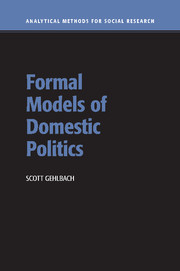2 - Electoral Competition under Uncertainty
Published online by Cambridge University Press: 05 March 2013
Summary
In this chapter we examine electoral competition under various forms of uncertainty. The models here depart from those in the previous chapter in assuming that voters behave stochastically—in how they cast their vote, or even in whether they vote at all. As we will see, the incorporation of stochastic voting behavior can resolve many of the issues associated with the models in the previous chapter, including nonexistence of equilibrium and full convergence of campaign platforms in equilibrium.
In considering the models here, a useful distinction can be drawn between individual uncertainty and aggregate uncertainty. For models with individual uncertainty only, stochastic behavior at the level of individual voters averages out in large polities. In contrast, with aggregate uncertainty, parties are uncertain about the general electoral environment at the time key decisions are made.
We begin by considering extensions of the Hotelling-Downs and Wittman models to incorporate individual and aggregate uncertainty, and we show how multiparty competition can be modeled in a random-utility framework. We then explore entry when the decision to vote is uncertain. Finally, we ask why citizens choose to vote at all.
Multidimensional Policy Conflict
In the last chapter we showed that multidimensional policy choice arises naturally in redistributive environments. As is well known from the theory of social choice, any division of a “pie” among a group of individuals can be beaten in a pairwise vote by some other division.
- Type
- Chapter
- Information
- Formal Models of Domestic Politics , pp. 27 - 45Publisher: Cambridge University PressPrint publication year: 2013



